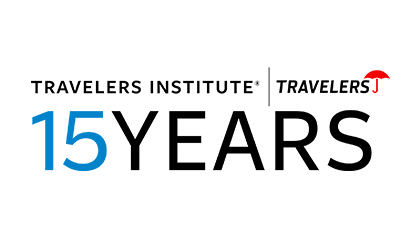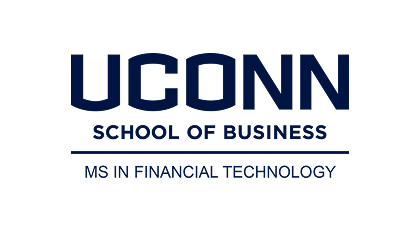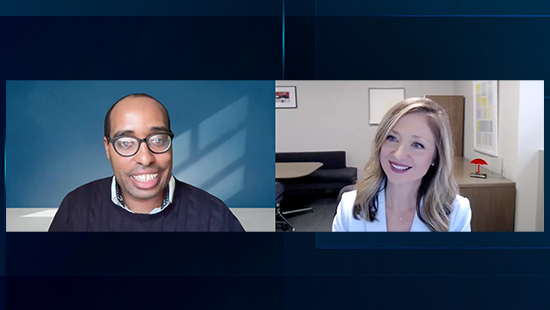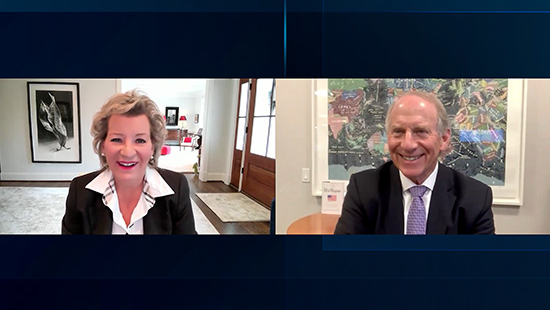The Geopolitical Landscape: Key Challenges for the New Administration

The Geopolitical Landscape: Key Challenges for the New Administration
February 5, 2025
Wednesday 1:00 p.m.-2:00 p.m. ET
A host of foreign policy and national security challenges await the new Trump administration, including the wars in Ukraine and the Middle East, tensions with China, the future of NATO, cybersecurity threats and the growing global influence of disinformation. How will the new administration respond to these challenges and what do these global dynamics mean for U.S. businesses? Michael Mazarr, senior political scientist at RAND, joined us to discuss today’s geopolitical risks, global hot spots, pressing foreign policy issues and takeaways for the business community.
Watch webinar replay
[MUSIC PLAYING]
(DESCRIPTION)
Text: Wednesdays with Woodward (registered trademark) Webinar Series. The Wednesdays with Woodward text appears on a laptop, situated next to a red mug with the Travelers umbrella logo in white. Joan Woodward appears in a labeled video call tile in the upper right. Text: Travelers Institute (registered trademark), Travelers. 15 Years.
(SPEECH)
JOAN WOODWARD: Hi, everyone. Good afternoon and thank you so much for joining us. I'm Joan Woodward, President of the Travelers Institute, and I'm really thrilled you're here with us today for such an important topic. Welcome to our series. Before we get started, I'd like to share our disclaimer about today's program.
(DESCRIPTION)
A man labeled Michael Mazarr briefly appears in the video call tile. The disclaimer appears. It reads: About Travelers Institute (registered trademark) Webinars. The Wednesdays with Woodward (registered trademark) educational webinar series is presented by the Travelers Institute, the public policy division of Travelers. This program is offered for informational and educational purposes only. You should consult with your financial, legal, insurance or other advisors about any practices suggested by this program. Please note that this session is being recorded and may be used as Travelers deems appropriate. Travelers Institute (registered trademark), Travelers.
The next slide says, Wednesdays with Woodward (registered trademark) Webinar Series. The Geopolitical Landscape: Key Challenges for the New Administration, above the logos for Travelers and the Travelers Institute, the Insurance Association of Connecticut, the National African American Insurance Association, The University of South Carolina Darla Moore School of Business, Master's in Financial Technology (FinTech) Program at the University of Connecticut School of Business, MetroHartford Alliance, and Connecticut Business and Industry Association (CBIA).
(SPEECH)
I'd also like to thank our webinar partners for today, the National African American Insurance Association, the Risk and Uncertainty Management Center at the School of Business at the University of South Carolina, the Insurance Association of Connecticut, CBIA, the Master's in FinTech Program at UConn, and the MetroHartford Alliance. So, thank you all for your partnership.
As we all know, a new president was sworn in just a few weeks ago. The new Trump administration is facing a much different world than when Mr. Trump came to office in 2017, or even when he left in 2021. The geopolitical risks to the United States and to the world have grown significantly. We have wars in Europe and the Middle East. We have significant tensions with China, militarily and economically.
We've had rapidly evolving and largely unchecked technology and AI. We have a rising number of authoritative governments around the world, and we've seen rapid growth in AI. And we've seen this explosive global spread of disinformation. It is a volatile and interconnected mix. What is going on, and why does it matter, and what does it mean for your businesses?
So lucky for us, I am joined today by a foreign policy expert who can break it all down for us.
(DESCRIPTION)
The next slide reads, Speakers. Joan and Michael smile in headshot photos above their names and titles. Text: Joan Woodward, Executive Vice President, Public Policy; President, Travelers Institute, Travelers. Michael Mazarr, Senior Political Scientist, RAND.
(SPEECH)
Michael Mazarr is a Senior Political Scientist at RAND and a professor of policy analysis at the Pardee RAND Graduate School. A writer and policy expert, he specializes in U.S. defense and national security issues, including force structures, disinformation, East Asian security, nuclear weapons and deterrence, and decision-making and uncertainty.
Previously, he worked at the U.S. National War College, where he was a professor and associate dean of academics, as president of the Henry L. Stimson Center, senior fellow at the Center for Strategic and International Studies, senior defense aide on Capitol Hill, and as a special assistant to the chairman of the Joint Chiefs of Staff. Mike has a Ph.D. in public policy from the University of Maryland, and we're really thrilled that you're joining us today. Mike, thank you so much for taking the time.
(DESCRIPTION)
Joan and Michael now sit in large video call tiles, side-by-side.
(SPEECH)
MICHAEL MAZARR: Sure. Really delighted to be with you here today.
JOAN WOODWARD: With the Trump administration now in power, give us a sense of the urgent geopolitical challenges facing them today.
MICHAEL MAZARR: Sure. For the United States with all of our global interests, there's always a tremendous amount of issues that any new administration has to tackle. I thought I would highlight just a few long-term trends that are underway that the administration is going to have to deal with, and then a few short-term, immediate, kind of not crises so much as policy challenges.
In the long term, the first one is what I describe as the maturation of China's ambitions. So we know that the rise of China has been a fundamental fact for a couple of decades now in the international system, but particularly under Xi Jinping, China is translating that rise into specific ambitions, not only in geopolitical sense, like the South China Sea, but in terms of technology ambitions, trade, political influence in different regions. And that is creating a sort of increasingly hard edge of Chinese power the United States has to deal with.
A second long-term trend is-- and you mentioned some aspects of this-- what I describe as a rising competition for digital sovereignty. So this encompasses cybersecurity and information security, disinformation across borders, and then this growing area of AI competition and this whole kind of increasingly digital dependence of modern economies, and the question of how nations protect themselves is a critical long-term issue.
And then a third one is what you can call the rise of middle powers. So the United States and China sit at the top of world politics, but there's a whole set of really important middle or swing states, some of them very established-- Germany, Japan-- some of them rising-- Brazil, Indonesia, Vietnam-- that are getting an increasing-- seeking an increasing voice in world politics. And working with them and finding ways to manage that alignment with those kind of countries is an absolutely critical diplomatic challenge.
Just as a quick sideline from an economic and developmental terms, long-term demographic trends and long-term debt trends create a really challenging environment for nations to try to manage long-term growth. So those are some of the long-term issues. Really quickly, some of the short-term policy challenges. Ending the war in Ukraine in a stable way, at least the current phase of the war, obviously.
Second one, I'd say AI safety. The next two to three years are going to see incredible breakthroughs in AI capabilities. There's a debate on the safety risks of that, in terms of threats to humanity, of out-of-control AI. And the next couple of years are a window to get some control over that.
The third one, Gaza reconstruction. This has obviously been in the news the last couple of days, but ending that immediate conflict and beginning the process of reconstruction in Gaza is a critical short-term priority. Restabilizing U.S./China relations over Taiwan after several years in which China has perceived the United States pushing the boundaries of the bargain we have is a critical challenge.
And then finally, I would say one that we don't know of. There's going to be a surprise within the next 12 months, some kind of attack, some kind of event, some kind of crisis, a war between two other countries, something that crops up that is going to steal a lot of the attention from this new administration. So there's these set of these short-term immediate things that need to be dealt with on top of these longer-term trends that U.S. global strategy has to try to manage and work to its advantage.
JOAN WOODWARD: Thank you for that quick trip around the world. I want to talk about-- there's three major conflicts right now, a high-intensity war in Ukraine, spreading violence and conflicts across the Mideast, and then the increasing China aggression in the Indo-Pacific, as you mentioned. Are these three regional conflicts in any way connected, or how could they metastasize into a global conflict? I mean, how do you prevent that?
MICHAEL MAZARR: Yeah. I don’t-- I mean, they're connected in the sense that the powers that are engaged in them, these revisionist powers-- China, Russia, North Korea, Iran-- are collaborating to some degree because their interests suggest it, but they really are very independent things. I mean, China's pressure in the South China Sea is a product of its own territorial claims, the fact that it views the South China Sea as its own private lake.
And it would be-- it was already doing that kind of coercive pressure before the current phase of the Ukraine war and would have done it regardless. Putin's ambitions in Ukraine are the product of decades-- and to some degree, centuries-- of Russian interest in Ukraine as a key to its security vis-a-vis the West. So they're all very distinct.
And I think I'm not really concerned about them metastasizing into some sort of a multi-pronged global conflict just because they're going on at the same time or something like that, in part because each of those countries also has very strong interest in avoiding a war with the United States because of how damaging it would be. So, these are very challenging, independent issues, but I think they're linked mostly at the margins.
JOAN WOODWARD: So maybe do you agree that there's this axis of upheaval-- you mentioned Russia, China, Iran and North Korea-- that's really trying to upend the international order and establish dominance in the Western community of nations? I mean, how should the U.S. be dealing with that?
MICHAEL MAZARR: Yeah. No, I mean, I don’t think-- I think it's a limited axis. I mean, they're certainly helping each other with North Korean troops in Ukraine, Chinese technology assistance to Russia, diplomatic support in various ways. But primarily what we're seeing is China is the power that is trying to, to some degree, either match or displace the United States at the top of the world hierarchy.
And these other states are seeking their own regional interests independently, and it benefits them all to cooperate to some degree. But as a group, Russia's interests are not the same as China's interests. China would not want Russia as an equal partner, because it sees itself as on top. North Korea and Iran are very much secondary players here, and Russia and China think of them as kind of extremely junior partners in this process, so it's really not a coherent group.
Now, they are collaborating in important ways, and there are experts in Russian military operations that will tell you that-- and also Russian economy-- that, absent Chinese support in various ways, Russia would be in a lot worse shape today trying to sustain its efforts in Ukraine. So there is meaning to their collaboration. But again, these are four very independent states, which in some cases resent each other, distrust each other, and so I don't think of it as a really tight group.
JOAN WOODWARD: OK. That's very, very helpful. Let's stay on China for a minute. They've been harassing the Philippines, Vietnam, Malaysia and Japan. We have security commitments to the Philippines and Japan and interest in keeping that region safe. So, have we done what it needs to be done to prevent this Chinese aggression from escalating in that region, or is it-- do you think it's almost-- is it too late? We've let it happen towards these countries, and what about our security agreements with our friends in the region?
MICHAEL MAZARR: Yeah. I mean, the situation in the South China Sea is so complex that we could spend more than an hour talking about it. I mean, briefly, China has territorial claims to essentially this whole area of water and the features within it. There's been an international legal ruling that says, specifically with regard to the Philippines, that China's claims are not valid, but China doesn't care.
China had made a number of steps, including grabbing some-- expanding some small, tiny little islands it has, militarizing them, putting bases on them. So there's a certain degree to which I wouldn't say it's too late, but certainly, China has made progress. Now, what we're trying to do is draw a line to keep China from simply militarily pushing U.S. friends and allies out of the way and grabbing what it wants. And with the Philippines, this has been the No. 1 concern.
Again, we could talk for a long time about Second Thomas Shoal, which is this shoal that's essentially underwater. It's not even a real above-water feature. To claim sovereignty, the Philippines grounded onto the shoal a World War II-era U.S. landing craft and has it manned with a handful of members of their military. You can look up pictures of it. It's called the Sierra Madre.
It's this rusting hulk that's sitting on this shoal, and it is a symbol of the Philippines' claim. China keeps trying to intercept Philippine resupply missions and essentially is trying to get the Philippines off there so they can claim control. They've been using water cannons. They've been ramming Philippine vessels, very coercive stuff.
So then to your question, the question for the United States is, how do we deter that? Where is the right place to draw the line? It wouldn't make sense for the United States to go to war with China over this underwater feature, but it is sort of a precedent for future things. So what we've done is we have said the United States-Philippine Mutual Defense Treaty covers Philippine personnel and Philippine vessels.
And if China attacks and sinks a Philippine vessel or kills Philippine personnel, that will engage the Mutual Defense Treaty, and the United States will have to be involved in some way. So that's the way we have tried to say, there's certain stuff that China is going to get away with, and we're not going to go to war over it. But if you push it too far, China, you will force us to get involved.
And the question is whether that has drawn enough of a line and what the U.S. interests really are there. So I think we've been doing a reasonably good job of trying to balance all these concerns, and we have drawn a redline against the most violent and kind of militarized Chinese aggression. But it is a never-ending struggle to push back against the Chinese coercive actions in that area.
JOAN WOODWARD: OK. Thank you for that. It's really complicated, and it's not in the news a lot what's going on in that region.
MICHAEL MAZARR: That's right.
JOAN WOODWARD: I appreciate you spending a minute on that. Let's go over to a different region, China. Should the U.S. be concerned about China's growing involvement in Latin America or in Africa? I mean, should this be front and center on President Trump's mind with regard to how they economically and otherwise are starting to influence these other places in the world?
MICHAEL MAZARR: Well, I've thought for a long time that Latin America ought to be more front and center on U.S. foreign policy and foreign economic agendas anyway, because critical trade partners, close to the United States, many shared interests, many emerging democracies-- there's a lot of reasons why we should be giving greater attention to this region, and in doing so, we would help address that Chinese challenge.
I think in Latin America and in other regions, China's trade relationship is enormous. Their investment relationship is very big. They're trying to build cultural and political ties. I think there are limits to what they can achieve. But what the United States-- this kind of gets back to the growth of middle powers and Chinese ambitions.
The United States is increasingly going to be confronting a world where countries have options other than the United States, and there's inevitably going to be significant Chinese economic interests in all of these countries. That's not necessarily a threat to U.S. vital interests. It only becomes a concern on specific issues when we want cooperation from those countries, and China is trying to push in the other direction.
But in general, yes, we should be concerned about where it might go, but it is not a process we can stop, and we have to learn how to live with it, and a generally more energetic U.S. strategy toward Latin America would be the main way to do that.
JOAN WOODWARD: OK, good. Let's move on. I want to talk just overall, what do you make of the Chinese posture towards President Trump since his inauguration? Is it as expected? Is it more significant than you would have thought? What is your view?
MICHAEL MAZARR: Yeah, I think it's sort of as expected. I mean, it's very much still in the process of emerging, and of course, the current discussion is all about the tariff response. So more broadly, there was an initial phone call with the new U.S. secretary of state and the Chinese foreign minister that appeared to be-- there was some reasonably tough language used on both sides, according to the official readouts that came out.
But it was a typical early discussion, and Secretary Rubio made some very good assurances about stability in the Taiwan situation and so on. So, on the general diplomatic front, it's too early to tell. We have the tariff issue. China has announced some limited retaliation for those tariffs, and then the million-dollar question is where that goes.
Does it settle down? Do both sides make some concessions and both sides have made a point, or does it escalate? But I think like many countries, China is trying to figure a way to manage-- as with all U.S. administrations, trying to figure a way to manage it. And it'll be months or even years before we see the full scope of how that plays out.
JOAN WOODWARD: OK. Thank you for that. One more question on Asia, then I'm going to go over to Europe. What about this political chaos that we see in South Korea? Is this something we should be concerned about in the U.S.? Is there any downside for us with this chaos going on?
MICHAEL MAZARR: Potentially, yeah. I mean, it's an interesting example of the fact that when Americans-- and even having been involved with the defense establishment for a long time-- when we think about other countries, even people with a lot of experience tend to think of them as sort of a black box. OK, South Korea. They're our partner. They're a geopolitical actor.
Let's start talking about South Korea without necessarily having a regular and very deep focus on the political dynamics in these countries and what that might mean. The Philippines is another great example. So yeah, over time, South Korea has sort of oscillated between more kind of progressive administrations that have been more skeptical of the U.S. alliance and conservative ones that have been more unconditionally embracing it. The alliance has remained healthy through all of that.
I really don’t-- I don't have any fears for the fundamental political stability of South Korea. I've worked on South Korean issues for a long time, been there many, many times. I think that the Democratic system is firmly established. Where it could go is political trends that might make South Korea rethink not maybe the full U.S. alliance, but the degree to which its balances between the United States and China, its position on other regional issues.
So yeah, these kind of political things-- I personally don't see it as a threat to South Korea's democracy or political stability in a grand sense. But yeah, it could have very significant implications for the kind of ally we're dealing with.
JOAN WOODWARD: OK. Thank you. Now, let's get on our plane and go over to Ukraine and talk about Russia's war there. What are the fundamental U.S. interests in this war, on the outcome of the war, relationships to NATO? What if Russia just walks away? I mean, what does peace look like? All those questions are on people's minds and wondered and worried about it.
MICHAEL MAZARR: Yeah, exactly. I mean, I would say we have two fundamental interests that the Biden administration was seeking to balance, and I'm sure the Trump administration will do the same. One interest is Russia's aggression cannot pay. We have to end this situation with a clear message that--
I mean, already Russia has paid an immense price in human lives, in economic resources, in international relations, in legitimacy. But it cannot end in a way that seems like a clear and unconditional Russian victory, because that would set a very bad precedent and would indicate that the West could not stop Russia from aggression.
But on the other hand, the other vital U.S. interest is beginning a move, which we never did fundamentally after the Cold War, to some kind of transatlantic settlement that Russia can actually live with. Now, maybe this is not possible with Putin, given his views, his ambitions, his paranoia about the West, his autocratic nature.
But the other interest is to get past this war and eventually bring Russia into some kind of a geopolitical settlement so that it would not see the need to go into Ukraine again in the future, and those are the two basic things we're kind of balancing.
JOAN WOODWARD: So what do you think, then, is the future of NATO? I mean, it's been a couple of years now. Ukraine has been wanting to join NATO at some point. Do you see a carving up of Ukraine to settle this, where Russia does get a piece of Ukraine that they currently occupy? Is that an outcome that would be acceptable?
MICHAEL MAZARR: Well, there's a lot of debate about how the war might end in the terms of that. Obviously, Ukraine has its own position. I think most objective observers would agree that if we want to end the fighting, it is not likely to be any kind of comprehensive peace settlement.
It'll probably be some version, at least initially, of an armistice-- like we have still in Korea after all these years-- but at least something that ends the fighting and, critically, then allows the United States and the West to help Ukraine begin to rebuild and turns Ukraine into an economic engine closely aligned with the EU and so on.
But is Russia going to remain in possession, at least temporarily, of some of the areas of eastern Ukraine, the Donbas, that it has? Very probably, in an initial peace settlement. But there's a big difference between that and a formal legal settlement that transfers sovereignty of these areas to Russia, which we should not, and I don't think could not agree to.
So there's going to be a process of ending the active fighting. And one of the questions there is the interest of the two sides, right? Does Putin have a real interest in ending the war? What kind of costs is he bearing? He's not afraid he's going to lose in the sense that his military will collapse, and Ukrainian forces will drive into Russia.
But is he worried about, for example, a debt crisis? Russia's been accumulating more and more debt. A lot of their foreign reserves have been seized internationally. Is he worried about rising inflation? Is he worried about a population that eventually turns against the war? Does he get to a point where he feels like, I need to make a settlement? It's not clear that he's there yet, because given recent trends, he may think that his forces are slowly gaining the advantage.
So you need both sides believing that a settlement is better than what they could achieve otherwise. I'm not sure we're there. You need both sides to compromise on their initial goals, which will be very painful. And then you need some kind of a guarantee process, and various things have been talked about of peacekeepers or whatever.
In terms of NATO in the near term, NATO has been very clear in saying that Ukraine's long-term membership remains on the table. I can't believe that there could be any settlement without some assurances to Russia that that's not going to actually happen, at least in the short term. That still leaves open potential EU membership. But the NATO membership thing, I find it hard to see how NATO would proceed with that in a stable way.
JOAN WOODWARD: OK. Last question on Ukraine. What do you make of the North Korean troops, and is it embarrassing for Putin to have to have troops from North Korea come and fight his war? Or is he welcoming them with open arms, because his folks don't have to die, then?
MICHAEL MAZARR: Yeah. Well, maybe a little bit of both. Of course, nobody really knows what-- I would have been fascinated to be in the room when someone first brought in the idea, the proposal on a piece of paper. Let's get North Korea. Or they've offered some. Do you want them? I mean, more infantry is useful, so he probably would have said, fine, if they want to support us.
Also, it's an interesting international symbol that we're getting support from somebody at least. The reports from the battlefield are that it's just-- I mean, in 50 different ways, this war is such a tragedy and a crime from the standpoint of Russia's aggression.
But these North Korean troops reportedly are engaging in Korean War-style mass infantry assaults, sustaining enormous losses. Just in the last few days, there were public reports, at least, that many of them were pulled off the front line temporarily. I don't know if that's true. They've not really made any kind of a decisive difference in those kinds of numbers.
An interesting fact, in terms of this multi-headed axis, North Korea has also given Russia a lot of artillery ammunition because Russia was running low to a degree. And a lot of the troops that were sent were some of North Korea's elite special forces-- allegedly, according to open-source reporting.
So North Korea may be somewhat militarily weaker than it was at the start because of the supplies and people that it has had to give to Russia in the process. So yeah, they haven't had a decisive effect. They've been operating in, I would say, sort of primitive, operational, tactical ways. And for the moment, that's kind of where it stands.
JOAN WOODWARD: OK. We're going to shift gears and go to the Mideast. The conflicts that have been going on have resulted in a huge amount of death and destruction, property wise and in souls. How does this end? We have a first couple of waves of hostages being released under the proposed peace agreement. Do you think that will hold?
We see Prime Minister Netanyahu in Washington yesterday with Mr. Trump, President Trump. How do you think this conflict ends? They're allowing the folks back into the Gaza region, and the death and destruction-- I mean, it's just overwhelming, what we're looking at. So where do you think this is headed?
MICHAEL MAZARR: Yeah, it is overwhelming. I don't know. There was always the question-- so one thing I would say is it's useful to put this into the context of 30 years of Middle East peace.
There was a time-- sort of just as I was first getting into this business decades ago-- that we were just coming out of the era when the security concern was a general war of the Arab world against Israel, that the surrounding states were seeking Israel's destruction, and Israel was defending itself against multiple state adversaries on its border.
And essentially, that is no longer true. Obviously, beginning with the process with Egypt and Jordan going through the Abraham Accords, then to the discussions. If we hadn't had October 7, you may have had a Saudi normalization of relations with Israel. So, in one sense, the situation of major state conflict has stabilized over time.
And Iran is a huge outlier to that process and continues to be a major threat to Israel and others in the region, and then Iranian proxies, like Hamas. So it is, I think, as unstable and dangerous and, of course, tragic as the current situation is, it's useful to think-- to realize that there were eras when it was even worse, potentially, in terms of the potential for major war among those countries in the region.
How this conflict ends-- there have been discussions from the beginning. What are Israel's goals? As the United States has found in multiple counterinsurgency wars, it is essentially impossible to eradicate an insurgent-style movement, even if you control a lot of the ground in regions, in part because if surrounding states are willing to give them sanctuary, then-- at least the public reporting is, I don't know what proportion of Hamas fighters have been killed, but it's not 100%.
So one question is, at what point does Israel say, OK, the campaign is over, and we're willing to move to the next phase? What does the next phase look like for them? What degree of control of Gaza would they insist upon or try to have?
All of these may be questions that have been settled, but they’re not-- there's not clear public kind of awareness of them. So I think it remains very unclear how that specific conflict will end and how the people who have been tragically driven from their homes might be able to come back.
And then there's the issue of Iran and its nuclear ambitions. In the last several weeks, you've had new reports from the IAEA, International Atomic Energy Agency, and other independent sources that Iran's production of fissile material, the plutonium, uranium-- or in their case, uranium that goes into bombs has advanced.
They've been purifying it to higher levels, and they are not that far away from the prospect of, if they have a bomb design, being able to move in the direction of their first potential nuclear weapons. It's not clear they'll take that step. They know the risks. They know what Israel has threatened.
And Iran is exceptionally weak right now because of the direct conflict with Israel that's happened, the U.S. and others engaged in, because of the enormous damage to their proxy, Hamas, and also Hezbollah, because of their domestic economic situation, which is extremely weak. So how ready are they to take a great deal of risk?
So I think once the Gaza situation can be transcended-- it's a bad word, because it's not a situation that-- so much death and destruction has happened. Otherwise in the region, there are sources of stability.
And countries like Saudi Arabia and UAE, which is already normalized, want to move in the direction of a stable peace with Israel and a region that is at peace. So there is the possibility of that down the road. But right now, I think it's very unclear how this immediate situation in Gaza is resolved.
JOAN WOODWARD: OK. Thank you for that. One last question in that region. What can we expect from Syria post-Assad? Is there anything that we should be looking for, or is there concerns?
MICHAEL MAZARR: Well, I don't know that country well at all, so there's not a lot I can say except from a U.S. and regional perspective. The analogy that always weighs on people's minds is Libya, where we went in with a U.S. and NATO operation to protect a city and other Libyans against the regime.
It metastasized into a regime change operation, and all stability collapsed. And you've had a situation of chaos and conflict that has spilled over into other countries since that time. That is the thing people are most concerned of avoiding with Syria, and so I think that that's the major issue there.
JOAN WOODWARD: OK. I'm going to step back and go to the Pentagon, and I want to ask you about what's going on with our military force in the United States. What would you advise the new secretary of defense to focus on? Where is the area that you're most concerned about with the U.S. military?
Is it recruiting? Is it replenishing the stocks of weapons that we've sent to places around the world? What are you most concerned of? Maybe your three biggest concerns. And where do you see optimism for what our military might-- has been able to do in recent years?
MICHAEL MAZARR: Yeah. Well, I'll say just an optimistic thing first. It is very clear that the United States retains by far the most sophisticated, capable and competent military in the world. And through a variety of military operations over the last 20 years, it's a very experienced force. It's a force of tremendous skill. So essentially, it's in good shape.
If you asked three things I'd say, it's bureaucracy, bureaucracy, bureaucracy. We have come to a point in American military-- and this is something that folks in the new administration, a lot of people are talking about, so it's very much a priority. But we have come to a point where our defense institutions-- for example, our defense procurement, how we buy weapons-- has become so complex and ossified that we simply cannot act as a major power anymore.
We can barely build a significant number of Navy ships every year because of where our shipbuilding has gone to, but also the bureaucracy surrounding procurement, the way it happens, the requirements process early on for generating requirements in weapons systems that creates these gold-plated things.
The bureaucracy inside defense institutions keeps us from acting quickly and putting-- there's a bunch of little experimental pieces in the defense establishment, like the Defense Innovation Unit, which are designed to have special permissions to buy things more quickly and have exemptions from certain regulations and contracting laws and things. But they are tiny fractions of the defense budget.
And if we could-- and this is all true at a time when we're on another cusp of-- I wouldn't say a revolution, but a significant evolution in the nature of defense technology with unmanned systems, with artificial intelligence, with quantum computing, with all manner of new operational concepts, how militaries fight, drones, obviously, those kinds of things.
So we need to be innovative, adaptive, open to new ways of doing business, and we just are not. I mean, there are many stories of people realizing a problem, setting out to solve it, and four years later at the end of the administration basically saying, I made about 5% of the progress I hoped to make because these institutions have just become so ossified.
So I think if major progress were made in the way we buy weapons, the kinds of weapons we buy, the kinds of innovations that go on within services and how quickly they can shift organization, force structure, things like that-- if we became significantly more innovative, that would be the single most important thing we could do to rejuvenate U.S. military power for the next decade.
JOAN WOODWARD: OK, good. So it can be changed. There is reason for hope. It's just someone has to get to it and make it a huge priority. So that's good to know.
MICHAEL MAZARR: Yeah.
JOAN WOODWARD: Yeah. Let's talk about technology, because the global technology race, as we've seen with this Chinese AI startup DeepSeek, it's really spooked Silicon Valley tech companies after releasing their AI technologies that matched others and performed better and at a much, much cheaper cost. How does this event affect national security and the AI race with China kind of moving ahead of us now in this arms race for AI? And what should or could the U.S. be doing?
MICHAEL MAZARR: Yeah. So I think this is one of the things that I would say-- AI's been in the news. We've been doing a lot of work on this at RAND. I've been involved in a geopolitics component of work on AI over the last year. I'm not a technology expert, needless to say, but we've been doing a lot of work on it.
And for folks on the line, if you're not spending some of your time every week becoming conversant with emerging models, their capabilities, their limitations, then I think you should be, because it is-- there's a lot of predictions of AI revolutions that suddenly are going to take over a lot of jobs, and it seems to happen more slowly than people predict, but the capabilities really are exploding.
And the answer to your question partly is in this context of, there's a significant belief by many who know the technology and some U.S. officials who became conversant with it that one country may get to a critical threshold first. And it's complicated to describe that threshold.
But essentially, it's developing models that are so super intelligent and able to promote more AI research that you get onto some sort of self-fueling feedback loop, and this technology just takes off. And there's an argument that whoever gets to that point first is going to then be able to put out unbelievable AI applications and achieve military and lots of other kinds of advantage.
Now, there's a debate about this. I mean, I'm one of those who think the process is likely to be somewhat more gradual and that there isn't a single threshold where suddenly China or the United States will jump across and dominate the world. But it is definitely a competition for advantage in a critical technology that is probably going to be the general-purpose technology similar to those of the early Industrial Revolution for the next era of economic development.
So, in all that context, the labs in the United States are spending billions of dollars to develop these frontier models, ChatGPT, of the latest version, 01, potentially 03, Claude, all the rest. China has labs developing them, too. We've been trying to keep the most advanced semiconductor chips away from China to limit their abilities.
But now, this incredibly innovative company, DeepSeek, and reading about the corporate culture of this firm is just fascinating, just incredibly innovative, and kind of employee centered. There's a debate about how much they spent, but for a fraction of the cost of the U.S. models, they came up with a model that many people believe rivals some of the best in the United States. So people said, oh, look. All of a sudden, China can match us.
The story is a lot more complex than that. It's not quite as good as some of the leading models. There are models being developed in the U.S. labs that are ahead of that. It's a very complex story, but the basic core of it is that there is an AI competition underway, not only between the United States and China, but Europe is having to play. Technology leaders in India are talking about this.
And this gets back to my theme of technology sovereignty or digital sovereignty. Having AI systems that are-- where you don't depend as a nation for others on your system. In the same way that we're concerned about Huawei building out 5G networks, do we want all American schools using DeepSeek where China could just turn off-- turn the key and shut it down, and we're dependent on them?
So this whole competition for AI, for independent, national sovereign AI, if we could describe it that way, for advances on the road to incredible new capabilities-- it doesn’t-- there's occasional news about AI, and things like DeepSeek crop up. It doesn't get a lot of play. But it is a really critical dialogue going on in national security circles and an important thing, I think, for people to know about.
JOAN WOODWARD: Wonderful. Thank you so much. Again, this is not something you read every day in the papers to understand the true global implications for it and the national security implications. I want to switch now and talk about misinformation, disinformation.
Have we reached a critical moment in the spread of disinformation when fact-checking is being rolled back at our biggest social media platforms? And you've studied disinformation, and I want to hear from you about, how is this all happened, the spread and the exacerbation of this new way of living, having misinformation, disinformation, and who to trust out there?
MICHAEL MAZARR: Yeah. I mean, I think, when I started, I talked about some of the long-term geopolitical trends that are going on. Those are building on top of a number of long-term societal trends. We've also looked at some of those in some of our RAND work, the Office of Net Assessment in the Pentagon. And one of the things-- probably the single thing that concerns me most, it's not just the spread of disinformation, it is the kind of corruption and collapse of a reliable information environment, whatever we call the context for information. And partly, it has to do with the fragmentation of sources of information, right? I mean, some folks on the call as old as me will remember the days when there were three big networks.
There were a few big major papers. You had these very legitimate kind of mediators, whether they were Walter Cronkite or Carl Sagan or whoever, the voices that spoke for expert authority. And it helped to create sort of a buffer in terms of the popular perception of issues and stabilize the discussions.
Now, it could also be too limiting, but it was stabilizing. You move into an era where obviously all of us-- I mean, I read more Substacks than I do newspapers these days. We've got dozens, hundreds, thousands of independent sources of information. We look on Twitter or X and see somebody making some claim, and they claim they have some evidence, and so it's this incredible disaggregation of information.
At the same time as you have a series of crises-- 2003 Iraq, 2008 financial crisis, and so on and so on-- that end up undermining people's faith-- and for good reason-- in leading institutions in society. So you've got these two things going on at the same time, and it just really causes severe dislocation in the information foundation of a society.
A colleague at RAND, Tim McDonald, and I are doing work on what people are calling our epistemic crisis. And so lots of folks online will know this, but this term epistemology is basically how we know things, the science of knowledge, the philosophy of knowledge, how we know things. And there is a crisis of how people gather information, process information and so on.
And that is the bigger reality behind the disinformation piece. What we found in some of our work on disinformation was-- now, this was a few years ago. But the stuff that Russia was trying to pump into the system in 2015, 2016, really was a fraction of what was going on domestically. So I realize that the issue of misinformation has become very politicized. And clearly, there was some stuff that was not misinformation, it was just different ideas that were labeled as misinformation and wrongly de-platformed. OK? So that went on.
But if we're talking about true misinformation, it's mostly a homegrown problem. It's not primarily our rivals causing this problem. If we can solve the problem at home, we won't, I think, have an enormous problem with our politics being able to be manipulated by outsiders.
So to me, the disinformation problem is really a problem of our information environment, a problem of, as I say, epistemology, how we know things. And in one of our projects a few years ago, one of the ways we put it was, democracy is an information processing mechanism. That's what it does.
And healthy democracies have institutions and nodes of sources of information and checking information, assessing information that are trusted and reliable and objective. And if we get to the point where we really don't have that, it's going to be very difficult to maintain political kind of coherence. So that's the somewhat worrying larger trend that I see disinformation being part of.
JOAN WOODWARD: OK. Thank you so much for that. I want to get to some audience questions. There's a lot here around, how are businesses back home impacted by these global affairs? What can U.S. businesses do to insulate themselves from this uncertainty and chaos and just understanding supply chains when there's wars, when there's conflicts? I mean, how can our business owners on the line here really navigate these times?
MICHAEL MAZARR: Yeah. I mean, some of the implications are sort of obvious. One-- I mean, it's a general thing, but I think it's more true than ever. And it's now a feature, not a bug, of the international system we're going to have, which is volatility, which is prepare for volatility, which is—which means-- And for firms of different size, obviously, this can mean very different things.
A number of years ago, I did a couple of years of work on risk management, looking at the risk management lessons of the financial crisis and the nature of risk management and things like that. And all too often in firms of various size, risk management is, it may exist, there may be people in a risk management department, but their warnings are kind of sometimes background noise to the imperatives of the business strategy.
And I think a process of preparing for consistent volatility by identifying the specific avenues of vulnerability, whether it's inflation, interest rates, general economic performance, China supply chains, as you mentioned-- where are the things that, if they become volatile, will directly affect us immediately?
How can we mitigate some of those risks? What are our hedging strategies? So that's one big piece. Now, companies, theoretically, are doing this all the time. But at least from my study of the risk management processes and from what I know, that sort of obsession with the risk of volatility isn't always there.
A second thing I would say is, as with countries, companies need to have-- it's been decades now. People are saying, every company has to have a digital strategy, right? So people have websites and e-commerce and all the rest. Companies, I think, need to have a digital sovereignty strategy in terms of cybersecurity, obviously, but also in terms of the employment of AI increasingly.
For what purposes? With what safeguards? Who do you rely on for the kind of models? In what way could your-- the digital aspects of your company be threatened by other countries, by competitors, by independent actors, independent hackers, those kinds of things? It's partly about cybersecurity. Everybody's thinking about that.
And it's partly about beginning to integrate AI. People are starting to think about that. But this notion of your digital security for individuals, for firms, for countries, in the next 10 years, that is going to become a leading obsession. And so, volatility and kind of digital sovereignty or security, I think, would be two obvious implications that I would draw.
JOAN WOODWARD: OK. Thank you. We're going to go to more audience questions. Gerald DeVeaux in New Jersey asks, after ignoring opportunities to do business with and influence Africa, is China's influence insurmountable there?
MICHAEL MAZARR: Yeah. It's sort of the same question to Latin America, I'd say. Yes, insurmountable in the sense that it has enormous influence and will continue to have it, in part because these countries in Africa, like most developing countries, don't want to pick sides. They want to have multiple options of the great powers, trading powers, investment sources that they have.
And this is particularly true in infrastructure, where China, through its Belt and Road Initiative, has put huge state resources behind infrastructure investments in a way that American private sector firms just don't typically do, because the profit motive isn't there as much. So yeah. It's unstoppable.
But again, not all of it is opposed to U.S. interests. Some of this infrastructure has been good for the economies of African countries. Some of the investment helps build business, which is good for stability. So the question is-- and this is something we've not yet done after a number of years of focusing on this competition. We need to understand, where is that kind of influence actually dangerous to us? Find those narrow pieces and then mitigate or compete on those levels. But the broader process of China's engagement with these countries is going forward.
JOAN WOODWARD: OK. Another question on China for you. Aaron Beecher in Wisconsin asks you, is a Chinese presence at the Panama Canal a national security threat to us, and how do you think this current discussion is going to end?
MICHAEL MAZARR: So, on the second part of the question, I have no idea how it's going to end. I wouldn't know what to predict. I mean, in terms of the China presence, I will say I'm not an expert on this. But China is acquiring influence in many sort of ports, sort of manufacturing hubs, places like the Panama Canal, through buying associated businesses and having some influence.
Could China shut it down? No. China does not own the Panama Canal. The United States could prevent China-- I mean, because of the proximity-- from doing anything. In the case of war, for example, if the Panamanian government was-- said, hey, come and save us from Chinese takeover, we could relatively easily do that relative to how China could project power.
So in a way, I'd say the same thing as I've been saying to some of these other areas. China's influence, economic and otherwise, is going to grow. In some places, it's going to grow because they build very close relationships with officials and influencers in these countries in various ways, and we can't stop that. We just have to say, OK, fine. But our truly vital interests are these, and that would be a redline for us. And at the moment, I'm not concerned that that redline would be threatened in the Panama Canal.
JOAN WOODWARD: OK. Question coming in from Gregory Neece, wants to know about, are you concerned at all with China owning so much of the US debt, and do they have economic leverage by owning this debt and potentially saying, no, we're not going to buy any more of your debt?
MICHAEL MAZARR: Yeah. Absolutely yes, I'm concerned. And absolutely yes, they have leverage. So this sits on top of the debt crisis in general. And this is another thing that most Americans-- maybe we hear it or see it occasionally. Look, Japan has a debt-to-GDP ratio I think over double ours, and they remain a very prosperous country.
We're not at the edge of a cliff. However, we have already begun to spend as much in interest servicing our debt as we do on the defense budget, and that ratio will only move in the direction of debt servicing.
One estimate-- now, this is a couple of decades out-- but by 2050, I think, if you look at all federal revenues-- because, of course, we're running a deficit, so not federal spending, but federal revenues-- and you take out Social Security, which theoretically is devoted to its own purpose, by 2050, close to 90% of all of U.S. current federal revenues would be going to servicing our debt. This is an unsustainable path.
And we are, I think-- I'm not an economist, but based on evidence I've seen-- entering a period of years where markets will really begin to take that more seriously. We've already begun to see this a little bit in the UK and some other places. So that creates a context in which if countries that are buying our debt-- notably China-- either sell some of the treasuries they have or slow down their buying, they can begin to affect interest rates, they can begin to affect market confidence, and they can really put a lot of pressure on the United States.
So getting our financial house in order, bringing the federal budget-- which will be incredibly difficult. I mean, I forget the percentage. Something like 30% or more of federal spending is now deficit spending, so we're talking about very serious cuts. But getting our budget into balance and just getting on a long-term trajectory to bring down the debt-to-GDP ratio, the total amount of debt relative to the size of our economy, is absolutely essential for our future prosperity and security as a great power.
JOAN WOODWARD: OK. Thank you. Chris Ewers asked this question about the China one-child policy and their economic potential, economic demise or collapse because of their demographic problem, and their aging of their population. Can you address that?
MICHAEL MAZARR: Yeah. So this is a worldwide problem, as you probably know. For those of you that are interested, there is a fantastic short summary of this. There was an article in Foreign Affairs by a guy that I know named Nicholas Eberstadt, “The Coming Demographic Collapse” or something like that. You could look it up. It has incredible statistics.
So worldwide, most developed countries and some developing countries are on a trajectory to begin shrinking their populations and shrinking their working age populations in particular. The replacement ratio-- you need have families on average have about 2.1, 2.2 children. And you've got countries-- like the most recent one I saw was Chile is at 0.88. South Korea is under 1.
South Korea's population has already started to constrict. So you have shrinking populations. What does that mean? It means a rising what they call dependency ratio, because you've still got the older generations there. You've got less new workers coming in. And I just saw a statistic the other day that China in particular was going to go from having something like 10 years ago, six workers per retiree to in another 20 years, like 1.6 workers per retiree, something like that.
I don't know if those are exactly the numbers. But you see the trajectory, right? So you've got this aging population with incredible social service requirements and a very small working age population generating wealth to try to support that. So you can see the potential implications.
The United States is in a better position, partly because of immigration, because we refresh our population with immigrants in ways that a country like China or even South Korea or Japan do not. And for other reasons as well, we're not as bad off, although we face the similar trend. So yeah. On top of many other things, demographics are going to be a significant constraint on China's future growth. And there's this huge discussion and debate about, what do they do about it?
There's a general view that they need to begin moving in more of a consumption-oriented economy, away from investment and export. They haven't been doing it. There's huge questions for China ahead, partly because of those demographic trends. But I want to stress that those trends pose an economic threat to countries throughout Europe. Italy, South Korea, Japan. Many countries face the risk of those demographic trends.
JOAN WOODWARD: OK. Another question from Jen Van Scoter. Are we going to see a move to more cyber warfare. And is the U.S. prepared in terms of waterways, electrical grid, infrastructure, that if China or Russia chose to create a cyber war in the U.S., are we prepared?
MICHAEL MAZARR: We've been trying to get more prepared. We are not fully prepared by a long shot, partly because if you think about it, so many of the things you just mentioned, the critical infrastructure throughout the country, water treatment plants, all kinds of things-- it's a huge variety of places that run on all kinds of different systems, some of them very old, some of them difficult to protect. China's been spending years, as we have seen in public reporting, burrowing its way into many of these things.
Now, the thing that's kept a cyber war from happening is deterrence in effect. We could do some similar things to them. Exactly what? Nobody knows, because those capabilities are classified. But there's a sense of everyone wanting to keep somewhat of a lid on it. If a full war were to begin between the United States and China, then possibly the gloves would come off.
But for the time being, you see this building of vulnerability on both sides. But I wouldn't be concerned about any kind of an all-out cyber war. One potential problem there is AI could be a very effective cyber warrior. You could have 100 cyber warriors powered by AI agents if you're an 18-year-old in a basement.
So the potential for individuals or small groups to begin causing mayhem will grow. We'll protect ourselves. It'll be gradual. I'm not predicting a complete disaster, but that's one of the reasons why I think this idea of digital protection is going to be just increasingly important.
JOAN WOODWARD: OK, Mike. Let's end on an optimistic note. Amid all this global chaos and uncertainty, what do you see in the world that does give you hope today?
MICHAEL MAZARR: So two things give me hope that I'll mention. One is, as much as we're worried about these regional conflicts, the idea of major war between great powers, which was the centerpiece of world politics for, essentially, thousands of years is something that really is not on the front burner. And primarily, it's because of nuclear weapons and also because of economic interdependencies.
The idea of China just invading Japan and going to war with the United States, it's just not in people's minds. So there are limits that have been established by technology, by economic interdependence, to most of the conscious aggression that big powers would try to do, which is a very good thing, and a big change from history, even though we take it for granted.
The second optimistic thing is there remains-- despite this axis, there remains a critical mass of world nations in Europe, in Latin America, in Southeast Asia, the ASEAN countries, Japan, Korea, Singapore, on and on and on, that want stability, that want peace, that want stable trade relationships, that want to control dangerous technologies.
So, if you counted by number of countries, there's an enormous majority of the world community that basically wants kind of stable and good relations. And if we can end the Ukraine war, get some better settlement with Russia, if we can manage the relationship with China-- otherwise, the international system is actually pretty stable. So there are strong reasons for confidence that we have a geopolitical situation that is not about to fall off a cliff, as I say, if we can manage some of these risks well.
JOAN WOODWARD: Wonderful. That is optimistic, and I'm an optimistic person, so I like you saying that our institutions will prevail, and our nations want peace. And I think that that's true. Mike, I can't thank you enough. Please come back and spend more time with us. It was just fascinating taking this little trip around the world with you, so thank you so much.
MICHAEL MAZARR: Well, thank you, Joan. I really enjoyed it. It was great being with you today, and I hope folks benefited from it.
JOAN WOODWARD: Yes. Yes. And to my viewers out there, please take our survey. It's in the chat, a link to the survey. Let us know what you thought about today's session. I read every single one of them. So, if you have a recommendation of a new speaker or a new topic, please write that in there as well.
(DESCRIPTION)
Text: Wednesdays with Woodward (registered trademark) Webinar Series. Take Our Survey. Link in chat. Text bubble icons float around the text. Text above a red microphone graphic says: Travelers Institute Risk and Resilience. Logos: Travelers Institute (registered trademark), Travelers.
(SPEECH)
If you haven't heard, we have a podcast as well, the Travelers Institute Risk and Resilience podcast available on Apple, Spotify, Google, so go get you some podcasts. They're pretty fun to listen to, I think.
(DESCRIPTION)
Text: Upcoming Webinars: Feb. 26: Live from Claim University: Behind the Scenes at Travelers' Flagship Educational Hub. Mar. 19: How Did You Sleep Last Night? Understanding the Fascinating Science of Sleep. Register: Travelers Institute dot-org.
(SPEECH)
And then we have our webinars coming up. February 26, we're going to take a step inside our very own Claim University in Hartford, Connecticut. It's going to be a behind-the-scenes look at our state-of-the-art training facility for our claim professionals. You don't want to miss that. That's really a fascinating place. I love going there.
And then on March 19, a world-renowned sleep expert is going to help us fall asleep, stay asleep and talk about his book, Why We Sleep. Dr. Matthew Walker is a fascinating person. I've heard him speak before. We spend about a third of our lives asleep, so we're going to look for those implications for healthier, more immune, memory, learning. All these things have to do with sleep, and I want to help you sleep better. I've recently done a lot of work on that for myself.
(DESCRIPTION)
Text: Join us live in 2025. In-Person Events: Feb. 10: Boise, Idaho, Small Business - Big Opportunity (registered trademark). Feb. 11: Spokane, Washington, Leading Your Business In 2025: Navigating the Economy, Public Policy and Cybersecurity. Register: Travelers Institute dot-org.
(SPEECH)
And then we're on the road next week. So, on February 10, we're going to be in Boise, Idaho, for a Small Business, Big Opportunity session, so please join us for lunch. February 11, we're going to be in Spokane, Washington, sharing an economic update with the cybersecurity symposium over a nice lunch.
So if you're in Boise or Spokane, go to our website. Please register. travelersinstitute.org. And Mike, thank you so much again. Thank you all for joining. Thank you for your engagement. Thank you for all your comments. We really, really appreciate it. Have a wonderful afternoon.
[MUSIC PLAYING]
(DESCRIPTION)
Text: Wednesdays with Woodward (registered trademark) Webinar Series. Symbols for a playing video, the LinkedIn logo, and a microphone appear. Text: Watch. TravelersInstitute dot-org. Connect. Joan Kois Woodward. Listen, Wherever you get your pods. The slide fades away. Logos: Travelers Institute (registered trademark), Travelers. Text: TravelersInstitute dot-org.
Listen to the podcast

Tune in to “The Geopolitical Landscape: Key Challenges for the New Administration,” available on Apple Podcasts® and Spotify.
Learn more, explore the most recent episodes and subscribe to the Travelers Institute Risk and Resilience podcast.
Summary
What did we learn? Here are the top takeaways from The Geopolitical Landscape: Key Challenges for the New Administration:
Three major regions currently pose challenges for the United States, explained Mazarr. The new administration will have to deal with the war in Ukraine, violence across the Middle East and China’s increasing aggression in the Indo-Pacific region. In Ukraine, it’s in the best interest of the United States to make sure Russia’s aggression doesn’t pay, he said, adding: “The war cannot end in a way that seems like a clear and unconditional Russian victory because that would set a very bad precedent.” In the Middle East, “it’s very unclear how this immediate situation in Gaza is resolved,” he said, adding that ending the current conflict and beginning reconstruction “is a critical short-term priority.” And as for China, “what we’re trying to do is draw a line to keep China from simply militarily pushing our friends and allies out of the way and just grabbing what it wants,” he said.
The U.S. will need to grapple with China’s rising ambition, Mazarr said. China has its sights set on not only specific geopolitical goals but trade, technology and political influence, such as its expanding role in Latin America, with trade, investments and increasing cultural and political ties, he said. “I’ve thought for a long time that Latin America ought to be more front and center on U.S. foreign policy and foreign economic agendas because they’re critical trade partners close to the United States, with many shared interests and emerging democracies,” he said, adding: “There’s a lot of reasons to be giving greater attention to this region, and in doing so we help address that Chinese challenge.” China’s ties with other countries “are not necessarily a threat to U.S. vital interests,” he said. “It only becomes a concern when we want cooperation from those countries and China is trying to push in the other direction.”
Increasing competition for digital sovereignty will play a major role in geopolitics, Mazarr explained. “This encompasses cybersecurity and information security, disinformation across borders, the growing area of AI competition and the increasingly digital interdependence of modern economies,” he said. “The question of how nations protect themselves is a critical long-term issue.” The next two to three years will see “incredible breakthroughs in AI capabilities” and offer a critical window of opportunity to make strides on safeguards. The Chinese AI model DeepSeek is making waves, and some experts believe one country will get to a critical threshold first, gaining military and other advantages, while others believe it will happen more gradually, he said. “That gets back to the theme of digital sovereignty, having AI systems where you don’t as a nation depend on others for your system,” he said. For example, if American schools became dependent on DeepSeek, “China could just turn the key and shut it down.”
The rise of middle powers is also changing the geopolitical landscape, Mazarr noted. “The United States and China still sit at the top of world politics, but there’s a whole set of important middle or ‘swing’ states seeking an increasing voice in world politics,” he said. “And working with them and finding ways to manage alignment with those countries is an absolutely critical diplomatic challenge.” These middle states include well-established countries, such as Germany and Japan, as well as rising countries such as Brazil, Indonesia and Vietnam, he said. “The United States is increasingly going to be confronting a world where countries have options other than the United States,” he said.
Geopolitical trends are building on societal trends like the rise of disinformation, Mazarr said. “It’s not just the spread of disinformation,” he said. “It’s the corruption and collapse of a reliable information environment.” This has been caused in part by the fragmentation of information sources, a major change from the era when there were three major networks, a few big newspapers and a handful of respected mediators who spoke with authority. “It could be too limiting, but it was stabilizing,” he said. Now we have thousands of independent sources of information, he pointed out. “There’s a crisis of how people gather and process information,” he said, adding that domestic misinformation is currently a bigger threat than misinformation from foreign powers. “It’s mostly a homegrown problem,” he said.
The United States must revamp its military bureaucracy to keep a leading edge, Mazarr said. “It is very clear that the United States retains, by far, the most sophisticated, capable and competent military in the world,” he said. However, the new administration must focus on reducing the bureaucracy that can hamper progress, he explained. For example, red tape within the procurement process and other areas prevents the building of a significant number of new Navy ships each year, he said. “This is all true at a time when we’re on the cusp of a significant evolution in the nature of defense technology with unmanned systems, artificial intelligence and quantum computing,” he said. “So we need to be innovative, adaptive and open to new ways of doing business.”
Businesses can insulate from global uncertainty by preparing for volatility, Mazarr advised. “For firms of different sizes, this can mean very different things,” he said. In general, companies can start by identifying the specific avenues of volatility for their businesses, such as inflation rates, general economic factors or Chinese supply chains, he said. Then find ways to mitigate those risks. “Companies theoretically are doing this all the time, but from my study of risk management processes, that sort of obsession with the risk of volatility isn’t always there,” he said. Second, companies should have a digital sovereignty strategy, he said. This includes cybersecurity as well as employment of AI with an eye toward safeguards. He advised considering who you rely on for the AI models and what specific threats your company could face from hackers, business competitors and other countries.
Despite challenges, there are reasons for optimism, Mazarr explained. “One, as much as we’re worried about these regional conflicts, the idea of major war between the great powers, which was the centerpiece of world politics for thousands of years, is really not on the front burner,” he said. That’s because nuclear weapons and economic interdependencies act as deterrents and limit conscious aggression by big powers, he said. Second, there’s a critical mass of world nations in Europe, Latin America, Southeast Asia and the Association of Southeast Asian Nations (ASEAN) countries, including Japan and Singapore, that want peace, stable trade relations and control of dangerous technologies, he said, adding: “There’s an enormous majority of the world community that wants stability and good relations.”
Speaker

Michael Mazarr
Senior Political Scientist, RAND
Host

Joan Woodward
President, Travelers Institute; Executive Vice President, Public Policy, Travelers
Presented by






Related content
Labor Market Outlook: A Conversation with LinkedIn® Economist Dr. Kory Kantenga
In this session, we explored how economic and demographic changes are shaping the current labor market and how these trends could factor into your hiring and retention strategies in 2025.

Future-Focused: Strategies for Engaging Emerging Talent
Why and how should organizations invest in emerging talent to recruit and retain tomorrow’s business leaders? In this webinar, we explored workforce demographic trends influencing the labor market and shared insights from existing talent programs.

Geopolitical Risks and Global Hot Spots: A Conversation with Dr. Richard Haass
Veteran diplomat and respected international relations scholar Dr. Richard Haass joined us on Wednesdays with Woodward to discuss the current global landscape, share insights on geopolitical risks and weigh in on the state of American democracy.
